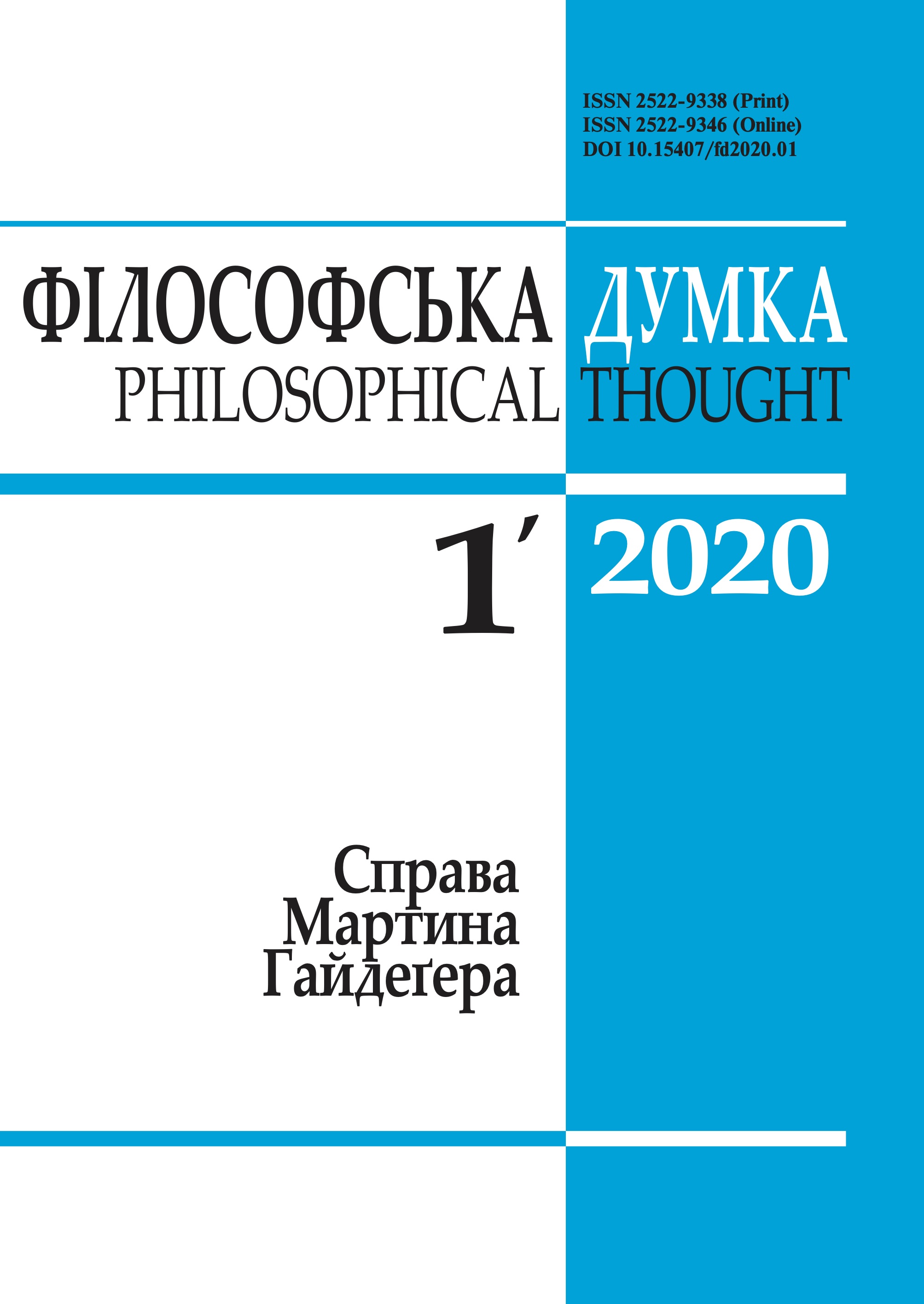Ihor Karivets.Martin Heidegger’s job of thinking
DOI:
https://doi.org/10.15407/fd2020.01.070Keywords:
Heidegger, being-between, everydayness, meaningful thinking, loneliness, death, DaseinAbstract
This article is dedicated to 130th Anniversary of German thinker Martin Heidegger. The main goal of the article is to develop Ukrainian reception of Heidegger’s philosophical heritage. The author considers the particularities of Heidegger’s understanding of thinking in the context of Dasein’s fundamental ontology. Thus, thinking is understood as being in a "tradition without tradition"; this, in turn, means the immediacy of thinking, which will never be past, never become a memory or a system of memories (beliefs). The element of thinking is the element of spontaneity, that is, of voluntaries: it is impossible to "develop" thinking or "teach" to think meaningfully, because it is a voluntary affair. The voluntary cause of meaningful thinking reveals the truth (unconcealedness) of being. The author considers the scenario of falling now-being into its non-existent existence, interpreting it in Heidegger's terminology as a state of "forgetting of being". This status is updated if it is transformed into a "techno-technological" object, which must act on certain algorithms and provide "development" or "progress" metrics.
The author develops the thesis that Dasein’s fundamental ontology of Heidegger reveals its condition as being-between. Being-between is not anthropological, but ontological category. The world of Dasein is everydayness between the birth and the death. The very being-between of Dasein induces its meaningful thinking. Following Heidegger, the author states that Dasein, that is lost in being-between, becomes centered (by subject) which pointlessly deploys power under the being. Therefore, in this context of Heidegger’s understanding of thinking the author also interprets the causes of such pointless existence of Dasein and its consequences. According to the author, now-being can save only reflection.
References
Harman, G. (2009). Levinas and the Triple Critique of Heidegger. Philosophy Today, Winter, 407-413.
https://doi.org/10.5840/philtoday20095348
Heidegger, M. (1954). Was heisst Denken? T bengen: Max Niemeyer Verlag.
Heidegger,M. (1959a). Gelassenheit. In: M.Heidegger, Gelassenheit,9-28.Pfullingen: Gunther Neske.
Heidegger, M. (1959b). Zur Er rterung der Gelassenheit. In: M. Heidegger, Gelassenheit, 29-73. Pfullingen: Gunther Neske.
Heidegger, M. (1967). Sein und Zeit. T bengen: Max Niemeyer Verlag.
Heidegger, M. (1998). Building, Dwelling, Thinking. In: T. Vozniak. Textes and Translations, 313-331. [In Ukrainian]. Kharkiv: Folio.
Kozachenko, N. (2019). What Critics Needs Critical Thinking? [In Ukrainian]. Actual Problems of Spirituality, 20, 97-117.
Levinas, E. (1996). Martin Heidegger and Ontology. Diacritics 26.1, 11-32.
https://doi.org/10.1353/dia.1996.0007
Nietzsche, F. (2004). Philosophy in the Tragic Age of the Greeks. [In Ukrainian]. In: F. Nietzsche, A Complete Collection of Works: Critical and Scientific Edition in 15 Volumes. Vol. 1. The Birth of Tragedy; Thoughts out of Season I-IV; The Works of Inheritance 1870-1873, 663-724. Lviv: Astroliabiia.
Tegmark, M. (2019). Life 3.0: Being Human in the Age of Artificial Intelligence. [In Ukrainian]. Kyiv: Nash Format.
Downloads
-
PDF (Українська)
Downloads: 411
Published
How to Cite
Issue
Section
License
Authors who publish with this journal agree to the following terms:
- Authors retain copyright and grant the journal right of first publication.
- Authors are able to enter into separate, additional contractual arrangements for the non-exclusive distribution of the journal's published version of the work (e.g., post it to an institutional repository or publish it in a book), with an acknowledgement of its initial publication in this journal.
- Authors are permitted and encouraged to post their work online (e.g., in institutional repositories or on their website) prior to and during the submission process, as it can lead to productive exchanges, as well as earlier and greater citation of published work (See The Effect of Open Access).


